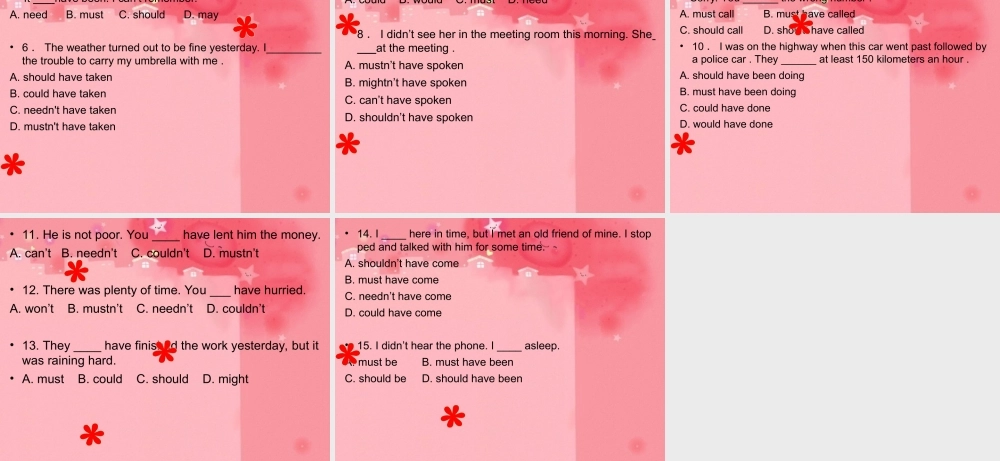“ 情态动词 +have done” 的用法 一、 “ must have done” 一定做过某事• 表示对过去事情的肯定推测,该结构只用于肯定句。 • 1. It must have rained last night, for the ground is wet. 昨晚一定下雨了,因为地面还是湿的。 2. You must have been mad to speak to the servant. 你和仆人说话,一定是发疯了。 二、 “ can‘t have done” “couldn’t have done” 不可能做过某事• 表示对过去事情的否定推测,“ couldn’t have done” 较少使用。• 1. Mr. Smith can‘t have gone to Beijing, for I saw him in the library just now. 史密斯先生不可能去北京了,我刚才还在图书馆见过他。• 2. Mary can't have stolen your money. She has gone home. 玛丽不可能偷你的钱,她回家去了。 三、 “ could have done” 过去可能做某事;本来能够做某事但没做• 有两种用法,一种表示猜测,“过去可能做过某事”;另一种是虚拟语气,表示对过去事情的假设,意思是本来能够做某事而没有做。 • What could have happened? 难道是发生了什么事吗?• He could have passed the exam, but he was too careless. 本来他能够通过考试,但是他太粗心。 四、 “ can have done” 较少使用到此结构• 表示对过去行为的怀疑,用于疑问句,译成“可能做过……吗?”。• 1. There is no light in the room. Can they have gone out? 屋里没有灯,他们可能出去了吗?• 2. There is nowhere to find them. Where can they have gone? 到处找不到他们,他们可能到什么地方去呢? 五、 “ may have done” • 表示对发生过的事情的推测,意思是“可能已经”或“也许已经”,用于肯定句中。 • —What has happened to George?• —I don't know. He may have got lost.• — 乔治发生了什么事?• —— 我不知道,他可能迷路了。 六、 “ might have done” • 表示对过去事情的推测, might 与 may 意思相同,但可能性更小。多用于虚拟语气结构中。• • 1. He might have given you more help, even though he was busy. (MET90) 他或许会多给你一些帮助,即使他很忙。• 2. She might have achieved greater progress, if you had g...



